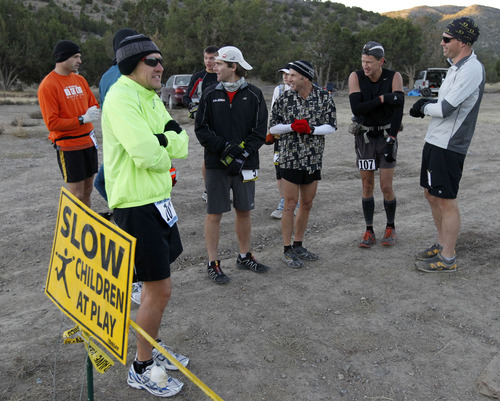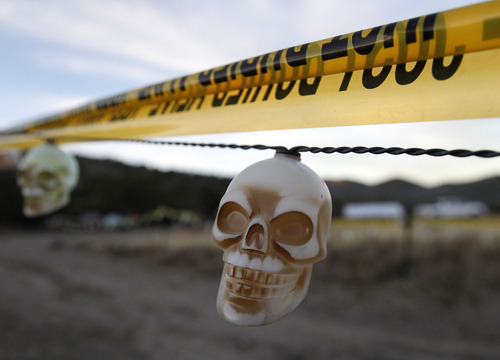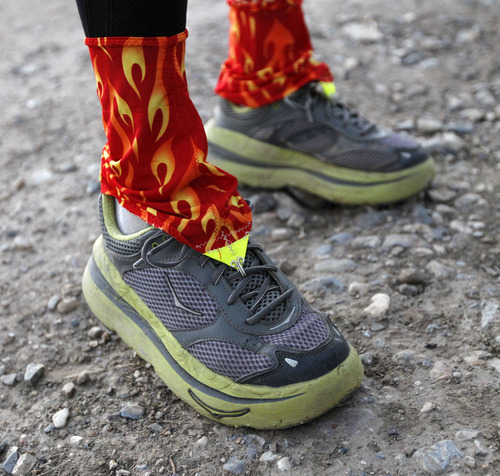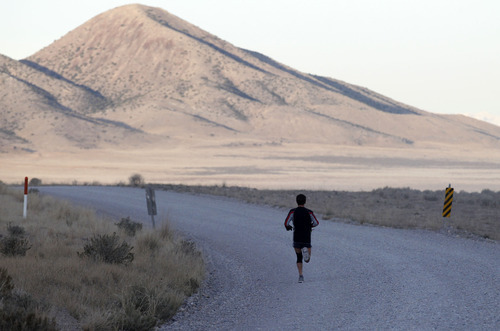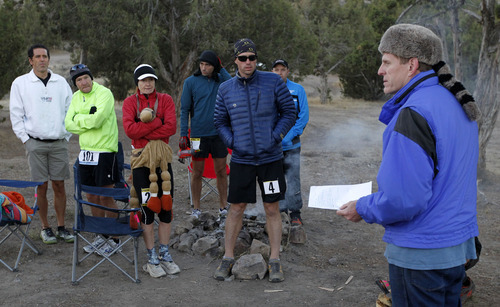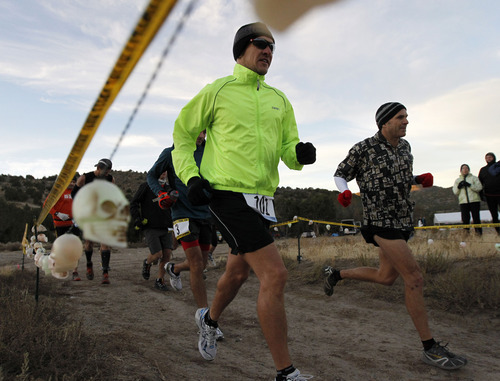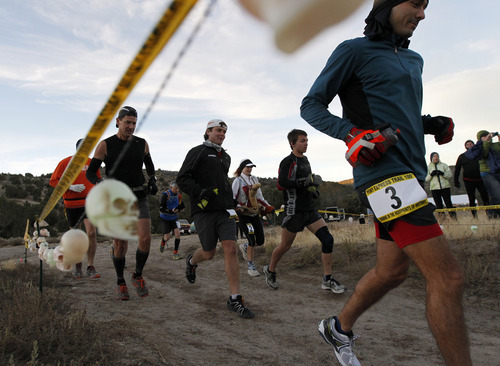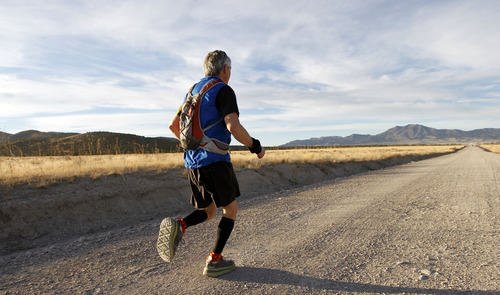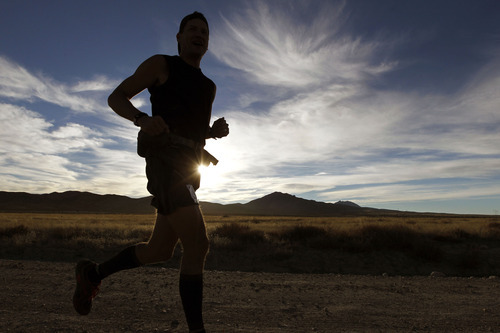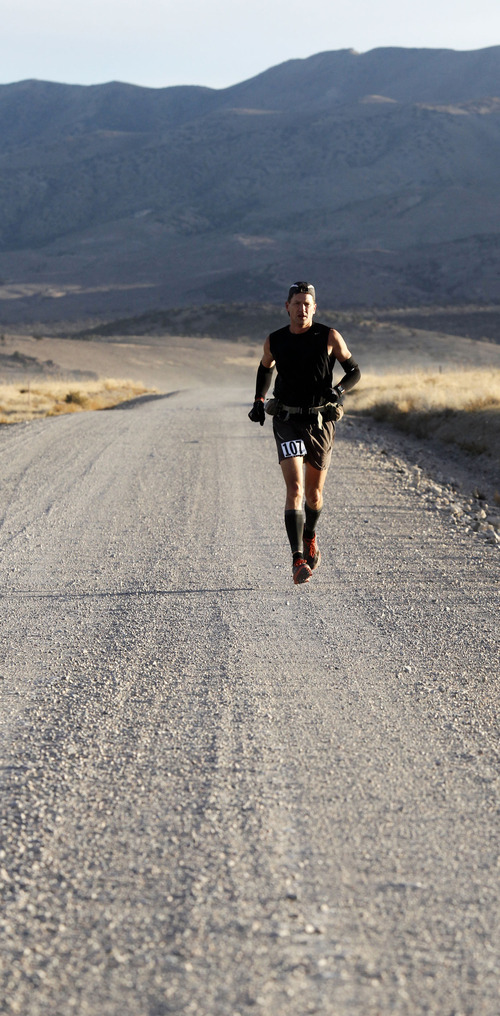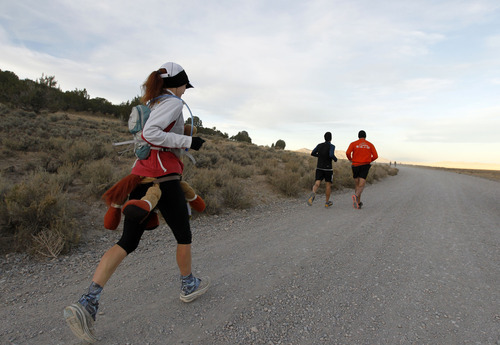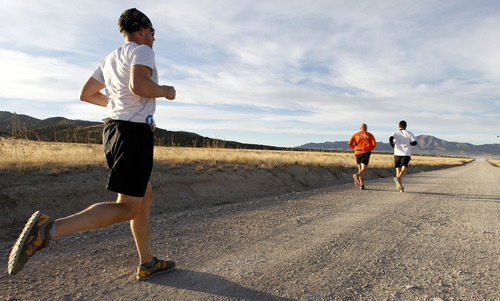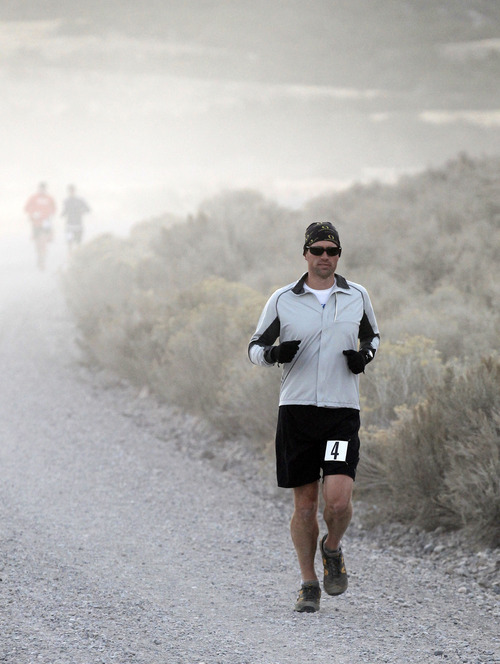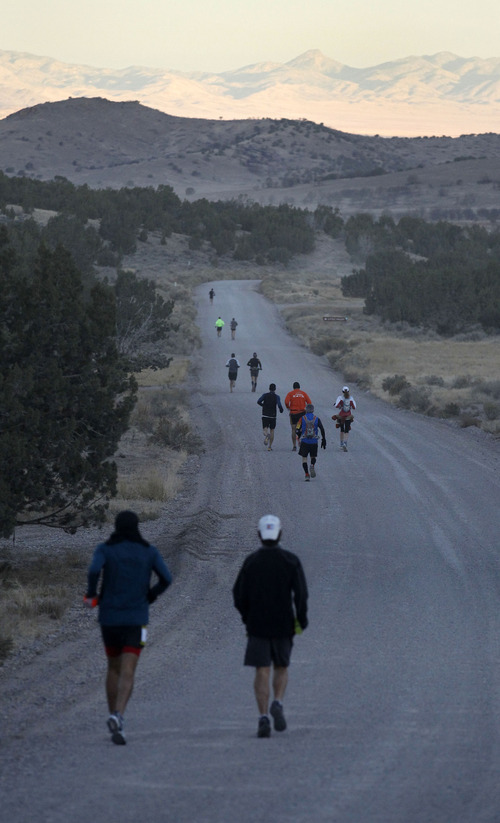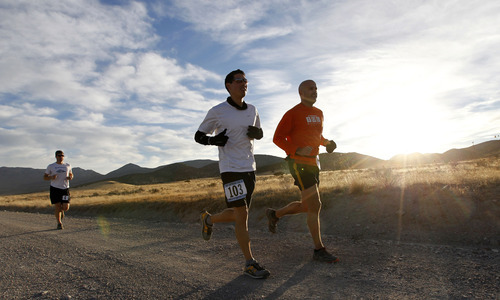This is an archived article that was published on sltrib.com in 2012, and information in the article may be outdated. It is provided only for personal research purposes and may not be reprinted.
Faust, Tooele County • Ask long-distance endurance runners why they do it and you'll get all kinds of answers — but they're all based on this: They love it.
For some, like Stephany Green, 34, mother of four young children, running is the best therapy in the world.
"It's my free therapist," she said. "It's great. I get up in the morning and go running and I'm a happier mom."
But not all distance runners put it into words. Like 51-year-old Jay Aldous, they just want to keep moving. Last year, he ran the 100-mile Pony Express Trail Endurance Run in 15 hours; 6 minutes. For folks like him, 26.2-mile marathons just aren't far enough.
"My view is that as humans, we evolved to run. We are uniquely engineered to be long-distance runners," he said. "As a society, we view the marathon as a great accomplishment. But we can go a lot farther. A 100-miler is not that far."
Friday morning, Green and Aldous and 73 others — accompanied by support crews — began hoofing it west along a picturesque route in remote Tooele and Juab counties in this year's Pony Express Trail 100 Endurance Run. Entrants can choose to go 50 or 100 miles along the unpaved course where horsemen galloped with mail bags from April 1860 to October 1861.
The race was formalized in 2006, but founder Davy Crockett — yep, that's his real name — stumbled into it several years earlier. One day, Crockett put on his running shoes and headed out the door of his Saratoga Springs home. As it turns out, the Pony Express Trail runs nearby.
"I just left my house and started running west," he recalled.
The 100-mile course for this year's event began about 10 miles west of Faust in Tooele County and continues west 58.2 miles through the rugged beauty of the high desert to Fish Springs National Wildlife Refuge in Juab County. Competitors then turn around and run to the finish at Simpson Springs, 16 miles from of the start. They have a maximum of 30 hours in which to finish.
The optional 50-mile course takes the same route but ends at the Blackrock Pony Express station.
This is Green's first attempt at a 50-miler. Her support team includes her husband, Micah Green, her parents and her four children, including her 21-month-old son, Beck, who was born with a rare muscle disorder.
He was never supposed to be able to walk or eat, she said. But with a lot of therapy, he now can. "He is my little miracle boy," she said.
She hopes her 50-mile run will inspire her kids.
"I had to prove to Beck that you can work hard and accomplish great things in life."
Another busy mother, Suzanne Dalebout, 42, lives in East Millcreek with her husband, two young sons and five dogs. She began running about 10 years ago, after she moved to Utah from Liverpool, England. She also owns and operates a financial planning practice that specializes in women's needs.
Dalebout likes running because she doesn't have to go to a gym or make plans.
"I have a busy lifestyle," she said. "The only thing that's easy to do is put on my shoes and run out the front door."
Dalebout has completed eight marathons. Her best time is 3 hours; 53 minutes. This is her first attempt at 100 miles.
"There is nothing left in me after a marathon," she said. "The 100-miler, I'm just intrigued to run as far as I can."
Marathoners often drink during races but typically do not eat. Not so for 50- and 100-mile endurance runners. For Dalebout, she refuels with fruit, yogurt, chocolate and chicken-potato soup.
Another participant, Adam Hall, a 33-year-old general contractor from Spanish Fork, ran his first 50-miler in March — The Buffalo Run on Antelope Island.
"My toenails have almost grown back," he said with a smile in Friday's pre-dawn darkness near the start line.
He trains two to three days a week with runs of 10 to 20 miles.
The endurance races are a "pride thing" for Hall. "I do it just to see if I can do it," he said. "It makes me feel good to do something not a lot of people can do."
After The Buffalo Run, he ached for days and his toenails turned purple and then fell off. "It's going to hurt," he said before setting off Friday at 7 a.m.
Fifty-three-year-old Lorie Alexander, from Vernon, British Columbia, has run 14 100-mile races and two "Bad Waters" — the 135-mile runs in the Mojave Desert.
Why does she do it? "Because I can," she smiled. "And because I can beat everybody younger than me."
She hopes to complete the Pony Express Trail 100 in 20 hours.
Like many endurance runners, she has no set training regimen. "I run on the weekends," she said.
But Graham Correia, 33, of Rochester, Mass., does have a regular training schedule. And so does his friend, Keeler North, 32. North also is a Massachusetts native but now lives in Colorado Springs. The pair hooked up in Utah for the Pony Express Trail run and hope to finish the 100-miler together.
North didn't take up running until 2006 in an effort to quit cigarettes and chewing tobacco. He's now run a number of marathons but never anything farther.
"Sometimes I feel terrible after a marathon," he said. "Other times I feel like a million bucks."
North said his strategy is to go out slow. "I just want to take it nice and easy," he said. "I just want to have a good time."
His friend, Correia, is a fitness trainer and runs about 100 miles a week as a means to a healthy and safe lifestyle.
"I have had a little bit of a checkered past," he said. "Running helps me get through tough moments."
Beyond that, he said endurance running provides a feeling of well-being. "Once you've done a long run — it's the best high you can have."
For more information of the Pony Express Trail Endurance Run, go online to ponyexpress100.org/.


